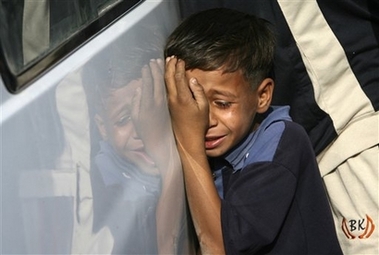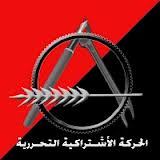Blog Archives
Iraq, winds of hope
Since the end of July, and despite continued terrorist attacks by the so called Islamic State (IS) against Iraqi civilians, massive popular demonstrations have taken place in the capital Baghdad and several cities in the south of the country mainly to denounce corruption in the country and the political bankruptcy of the ruling sectarian political parties. Demands of the protesters notably included the dissolution of parliament, the end of the domination of the clergy on the structure of the Iraqi state and the modification of the Constitution to end the sectarian quotas. The demonstrations also condemned the continuing failures and power outages, deteriorating public services and increasing social inequalities. Read the rest of this entry
Interview with the Kurdistan Anarchists Forum (KAF) about the situation in Iraq/Kurdistan
 This interview was carried out by http://www.alasbarricadas.org on 3rd September 2014. The English translation has been edited for readability by Anarkismo.net.
This interview was carried out by http://www.alasbarricadas.org on 3rd September 2014. The English translation has been edited for readability by Anarkismo.net.
ALB: How are you now ?
We are fine but like many of you extremely concerned about the current situation in Iraq in general and the Iraqi part of Kurdistan in particular. We are very active in the social media with respect to writing, making comments and discussing the current crisis that exists with different people and groups.
IRAQ: The possibility of breaking up Iraq
 A few weeks ago, in one of our bulletins, we (the Kurdistan Anarchists Forum) expressed our opinions and attitudes regarding the Islamic State in Iraq and the Levant (Isis), its attacks on Iraq, and the religious and political struggle between the Shia and Sunni for domination. Here in this statement, we put forward our views about the political situation, the possibility of a divided Iraq, and the current war. Read the rest of this entry
A few weeks ago, in one of our bulletins, we (the Kurdistan Anarchists Forum) expressed our opinions and attitudes regarding the Islamic State in Iraq and the Levant (Isis), its attacks on Iraq, and the religious and political struggle between the Shia and Sunni for domination. Here in this statement, we put forward our views about the political situation, the possibility of a divided Iraq, and the current war. Read the rest of this entry
خطاب مفتوح للرفاق بالحركه الاناركيه-كردستان/ An open letter to comrades in the Kurdish anarchist movement from the Libertarian Socialist Movement (Egypt)
الرفاق الاعزاء بالحركة الاناركية الكرديه
وصلنا عتابكم لنا على تأخرنا في اصدار بيان تضامن مع الشعب الكردي والأقليات بشمال العراق وسوريه والتي تتعرض لهجمة وحشية مخيفه من التنظيم الفاشي المعادي للبشر المسمى (الدوله الإسلاميه بالعراق والشام)، ولعل لكم كل الحق في ذلك العتاب، فقد كنتم دائما سباقين في دعمنا والتواصل معنا كحركة أناركية بمصر، لكن ما منعنا من أصدار مثل ذلك البيان هو شعورنا بعجز الكلمات وتقزمها أمام ما تتعرضون له كشعب وما تتعرض له أقليات شمال العراق وسوريه، فكل ما تعرضنا له من مضايقات لا يساوي شيئا مقارنة بالهول المخيف الذي تتعرضون له، أي بيان يمكننا ان نصدر؟ وأي كلمات يمكنها ان تعبر عما في نفوسنا من غضب وحزن وألم؟ إن بيانات التضامن والإدانه لم تعد تعني شيئا، ولن نقزم مأساتكم بإصدار مجرد بيان إدانة وتضامن، إننا ندرك تماما ان الانتفاضات الشعبية التي سميت (الربيع العربي) على ما شابها من قصور في الوعي وضحالة في الأهداف والأليات كانت زلزالا ارعب ليس فقط الأنظمة الديكتاتورية العميله بالمنطقه، بل اصاب بالذعر القوى الإمبرياليه السلطويه بالعالم كله وهم يشاهدون عدوى تلك الأنتفاضات تنتقل لبلدانهم في الولايات المتحده واليونان وأسبانيا وتركيا وغيرها، كما اصابت تلك الانتفاضات القوى الرجعيه المحليه العميله بالفزع وهددت بعصر جديد تستيقظ فيه الشعوب وتنهض لتأخذ زمام المبادرة بنفسها دون إتكال على حزب أو تنظيم سلطوي، فكان ان سلطت الرأسمالية العالميه سلاحها القديم المجرب جيدا (الفاشيه الدينيه) لتجعلها السلاح الذي يدمر تلك الانتفاضات الشعبيه ويخرجها عن مسارها ويحطم أي امل او طموح لها ويحولها لمطية لوصول تلك الفاشيات للحكم كبديل للفاشيات القوميه والوطنيه التي أهلكتها الشيخوخة والفساد، إن الكيان الإجرامي المسمى (داعش) ليس سوى إعادة إنتاج لكل بشاعة النازيه الهتلريه في ممارسته للتطهير العرقي والمذابح الجماعيه، ذلك الكيان المعادي للبشريه الذي أستخدم لتحطيم الثوره الشعبيه السوريه والقضاء على أي امل لتحرك ثوري شعبي بالعراق، يقوم الان بتدمير شعوب المنطقه نفسها، ماديا ومعنويا عبر المذابح والإباده الجماعيه، متسلطا على الأكراد والمسيحيين واليزيديين وكل الأقليات العرقيه والدينيه بقدر ما يتسلط على الأغلبيه العربيه السنيه مدمرا اياها ومخضعا لها لرؤيته الشيطانيه للعالم Read the rest of this entry
Iraq and Syria: The struggle against the multi-sided counterrevolution
by Michael Karadjis
As a coalition of Sunni-based forces, including the Islamic State of Iraq and Sham (ISIS), took the major northern Iraqi city of Mosul and then most of the Sunni heartland in the north and west of Iraq, regional and western capitals went into crisis mode: the entire post-US occupation stabilisation had collapsed in a heap.
And the coalition leading this revolt consists of none other than the same forces which led the Iraqi resistance to US occupation throughout the middle years of the last decade. Yes, once again the arch-reactionary ISIS itself has revealed its brutality, with reported mass killing of captured soldiers, a crime against humanity; in the same way that monstrous acts, such as bombing work queues and Shiite mosques, were carried out during the anti-US resistance by al-Qaida in Iraq (ie, what became ISIS); horrific repression is partly to blame for breeding horrific reactions. In both cases however, this most violent and irrational element does not define the movement, still less explain its strength. Read the rest of this entry
IRAQ: On Recent Events in Mosul and Other Cities in Iraq
Mosul and other cities in Iraq are experiencing dramatic, dangerous, and fateful changes.
The media, especially that which is allied with the Iraqi government and western states, has been focusing on the Islamic State in Iraq and the Levant/Syria (ISIS) and its control over several Iraqi cities, provoking its audiences against the militant group. Indeed, ISIS terrorist groupings do exist among armed groups there and its influence in the recent events is clear. However, it is also true that Iraqis generally reject ISIS, whether in the central or southern regions of Iraq or in parts of the country that are no longer under government control: the so-called “Sunni” areas or the “Sunni Triangle”, a term that intelligence services, particularly the US Central Intelligence Agency (CIA), devised as part of a plan to engineer sectarianism in Iraq. At the same time, Iraqis generally reject Maliki’s regime and its policies, built as they are on an ethno-sectarian basis. This is especially the case in urban areas where sectarian discrimination is most concentrated, wherein the government treats ordinary people as political enemies. Read the rest of this entry
IRAQ: Class struggle in Iraq – interview with a veteran
An interview covering class struggle in Iraq from the ’40s to early ’90s in Iraq.
The following interview was first published in ‘Workers Scud – no patriot can catch us!’ (London, June 1991), a collection of articles reflecting on the Gulf War.
The Class Struggle in Iraq – an interview with a veteran
Q: Can you briefly tell us about the class struggle in Iraq before the overthrow of the monarchy in 1958?
A: In the 1940’s and early 1950’s the class struggle was mainly situated in the rural areas. Peasant uprisings (eg. in Aali-azarchi which lasted about 3 years before being violently suppressed) were a constant headache for the semi-feudal landowners and the state.
Urban struggles intensified with the nine-day strike of Kirkuk oil workers in 1946 (put down with loss of 10 lives). Unemployment and homelessness were rampant. There were thousands of sarifas (shacks made of palm branches) around and inside Baghdad.
1956 (Suez Crisis) had a massive impact on Iraq, with demonstrations against the Iraqi regime who were seen as British stooges. The Palestinian issue also helped radicalisation. I still wonder why there wasn’t a revolution in 1956!I These internal and external events led to the formation of the Free Officers (nationalist/Nasserist) who had links with the Iraqi ‘Communist’ Party (l.C.P.) but not so much with the Ba’ths. Read the rest of this entry
IRAQ: Rise Up Iraq
by Ali Issa Mar 20 2013
![[Baghdad's Tahrir Square, June 2011. From the Organization of Women's Freedom in Iraq.] [Baghdad's Tahrir Square, June 2011. From the Organization of Women's Freedom in Iraq.]](http://web.archive.org./web/20161122222442im_/https://i0.wp.com/www.jadaliyya.com/content_images/3/OWFI-June-2011.jpg) Baghdad’s Tahrir Square, June 2011. From the Organization of Women’s Freedom in Iraq.
Baghdad’s Tahrir Square, June 2011. From the Organization of Women’s Freedom in Iraq.The street that your question describes as “quiet” is actually silent only as a result of repression, especially after the protests of February 2011 when the authorities revealed their violence openly—using the army to clamp down on nonviolent protests and firing live ammunition at peaceful protestors.
— Falah Alwan, 22 January 2013, The Federation of Workers Councils and Unions in Iraq. Read the rest of this entry
International anarchist statement against the Iraq war from 2003
The statement below was issued before the war by anarchist groups from all over the globe. This included organisations in Ireland (WSM), Britain, France, Sweden, Argentina, Lebanon, Belgium, Turkey, Portugal, South Africa, Germany, Canada, Spain, Mexico, Brazil, Italy, USA, Switzerland and Croatia. Read the rest of this entry
IRAQ: Child Kidnapping on the Rise, Again: Another Legacy of the US Occupation
by Dirk Adriaensens, BRussells Tribunal
:: Article nr. 93049 sent on 29-nov-2012 18:19 ECT www.uruknet.info?p=93049
 |
| On 6 November, 21 children were abducted from different places in BaghdadNovember 28, 2012
The security situation in Baghdad has not improved. Families are living in fear because of a dramatic increase in the number of cases of child abduction. Read the rest of this entry |


![[ISIS fighters in Iraq. Image from Creative Commons/Google.]](http://web.archive.org./web/20161122222442im_/https://tahriricn.files.wordpress.com/2014/06/the-impending-collapse-of-iraq-in-one-chart.jpg?w=150&h=106)